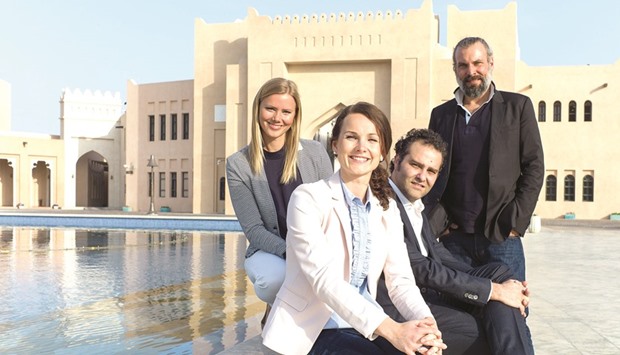Rarely do we encounter a concert drama that manages to faithfully translate the richness of Qatari cultural heritage while spinning a musical narrative for all ages. A labour of artistic love of four top talents, Nour is that special project.
Directed by Svetlana Schmitz and MAias Alyamani, the family concert ‘Nour, A Girl of the Desert’, is sure to win the appreciation and applause of a prospective full house at the Katara Opera House, where it premieres this Friday evening – tickets are priced at QR75. Syrian violinist and composer Alyamani, the founder of MAqam Ensemble, has composed the music, which will be performed by him and other musicians of the Qatar Philharmonic Orchestra (QPO).
Alyamani’s music uses Qatari-oriental melodies to celebrate Qatari identity, establishing a dialogue with the audience in a playful manner. His music introduces the rich world of Arabic sounds to young and old alike, we are told. Svetlana Schmitz of ACTory has written the story. Along with Tamara Schaefer of ACTory, she will perform with costumes and sets. Kindergarten and drama teacher Schmitz and drama teacher Schaefer founded the theatre duo ‘ACTory’ in 2014, here in Doha, and since then, they have “enchanted kids as well as adults with a variety of theatre such as shadow theatre or scenic plays”. To top it off, the performance will be accompanied by Christoph Schmitz as narrator.
Clearly a celebration and a hearty exploration of the Qatari identity with its music, why was it necessary for Alyamani and his friends to present Nour, in the form of a musical show? “I have lived in Doha for almost 10 years, and as a member of this society, I have always wanted to participate in building the cultural scene of this country. As a musician, the best way with which I could contribute to Qatar, I feel, was to make a musical which represents me as a musician,” Alyamani tells Community, just four days before the big concert. “I met Svetlana who had the same enthusiasm to make something artistic and celebratory for this country. So we started to work on this project together. Svetlana wrote a nice libretto and we worked together to create Nour with our friends Tamara and Christoph.”
At the heart of the story is Nour, a girl whose family lives in a village in the desert. Her grandfather teaches her to play the oud, showing Nour how music can tell stories about desert life. Though her parents don’t encourage her, Nour practices a lot. One day the family moves to a big city. What appears to be an exciting adventure turns into a big challenge for Nour. But with inner strength and her love of the oud, she finds her way and connects with her new world.
Alyamani says, “What I like about traditional Qatari music is how very pure and honest it sounds. And for me, as a composer, I find it easy to work with Qatari musical elements since they are original and have a unique character to them, which only helps while composing. Moreover, I am lucky to forge a wonderful musical collaboration with Qatari composer Dana Alfardan, who is putting in great efforts to support the culture in Qatar. My collaboration with her helped me to also work and understand Qatari music from another perspective, which in turn helped me in writing the music of Nour.”
How challenging then was it for Alyamani and his three friends to create a moving musical story that would also be easily accessible for the audience? “Actually, it was very difficult. We are still in the phase of modifying and changing bits, which will continue until the last moment,” he says. “What is special about this kind of a project is that every performance is different and unique. We have a great experience with interactive shows, and we will enjoy this together with the audience.”
As for the current music scene in Qatar, Alyamani feels it’s moving in the right direction. “It’s going great. Musically, QPO plays the most important role in Qatar in addition to the music group ensembles in Qatar, established by members of the Qatar Philharmonic. We have a wonderful production team in Doha, wonderful studios, and concert halls. What we miss is more music festivals and the support for local music groups. We are lucky to come together and create the music scene in this country which we love,” he says.

From left, Tamara Schaefer, Svetlana Schmitz, MAias Alyamani and Christoph Schmitz. Photo by Georges Yammine
